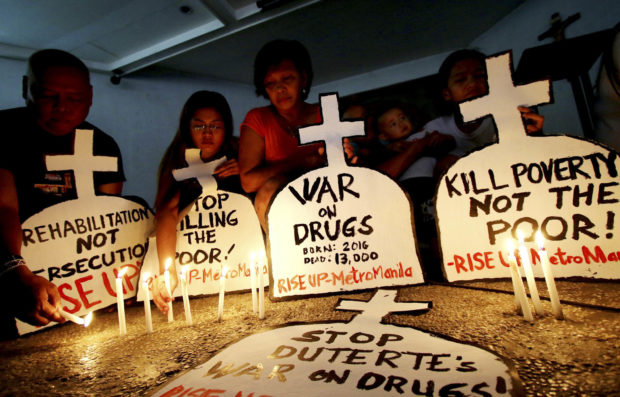
PROTEST VS KILLINGS Relatives of slain drug suspects light candles to remember their loved ones at a Church-sponsored gathering in Manila. —RICHARD A. REYES
Catholic bishops have appealed to the authorities to ensure that a fresh crackdown on narcotics will not lead to a further “waste” of human life as the Philippine National Police relaunches “Oplan Tokhang” on Monday for a more active role in President Rodrigo Duterte’s ruthless war on drugs.
In the old “Oplan Tokhang,” police visited homes of drug users and suspected drug dealers anytime and sought their surrender.
This time, however, the visitations will be carried out only during daytime and under new guidelines aimed at preventing the killing of suspects, such as the carnage that characterized the first 18 months of the war on drugs.
In a statement issued in Cebu during the plenary assembly of the Catholic Bishops’ Conference of the Philippines on Sunday, Archbishop Romulo Valles, the new CBCP president, urged the police to always follow the law in dealing with drug suspects.
“We pray that the police follow the prescribed steps in implementing the law … steps that should be done in exercising their responsibility as policemen,” Valles said.
“Let us inspire them to follow the necessary steps when they need to apprehend and as much as possible, we make sure that we do not waste any lives,” he added.
‘Reign of terror’
The CBCP has sharply criticized Mr. Duterte’s war on drugs, calling it “reign of terror” in poor communities.
The US-based Human Rights Watch (HRW) has said the drug war has taken the lives of more than 12,000 people since the launch of the campaign in June 2016.
The PNP disputes the HRW figure, saying only 3,987 people have been killed in antinarcotics operations, while 11 percent, or 2,235, of the total 19,560 murders under police investigation are drug-related.
The bishops appealed for an end to the killings while calling for the country to “start healing.”
The killings abated after Mr. Duterte demoted the PNP from the lead role in the drug war last October after the execution of three minors in Caloocan City sparked widespread public anger that pulled down his ratings.
The President also disbanded the PNP antinarcotics force after several officers from the unit were involved in the kidnapping and killing of a South Korean businessman in an operation disguised as a Tokhang visit.
Mr. Duterte gave the pursuit of the drug war to the Philippine Drug Enforcement Agency (PDEA), a small force that PNP Director General Ronald dela Rosa had openly doubted could effectively handle the country’s drug problem.
The President allowed the PNP to back up the PDEA. It’s unclear, however, why he has allowed the relaunch of Tokhang.
Killings never stopped
Caloocan Bishop Pablo Virgilio David earlier expressed concern that the daily killings might happen again with the relaunch of the police campaign.
“Tokhang was suspended but the killing of alleged drug suspects never really stopped. What to expect with [this] relaunching? Your guess is as good as mine,” David said in a post on Facebook.
David demanded an update on the cases of thousands of killings during the first two editions of Tokhang.
He said the lack of credible findings on those cases would only make the third iteration of Tokhang a cause for concern.
Police, however, are promising changes in the pursuit of the campaign.
Director Oscar Albayalde, chief of the National Capital Region Police Office, on Sunday said police officers would no longer conduct “One-Time, Big-Time” (OTBT) operations this time.
Thirty-two people were killed in 24 hours when the PNP launched the first OTBT operation in Bulacan province last Aug. 15.
In Metro Manila, 25 people were killed in similar operations two days later.
‘Oplan Galugad’
This time, however, “[t]hat ‘One-Time, Big-Time’ operation term is no more,” Albayalde said in a radio interview. “What we have is ‘Oplan Galugad.’”
“Galugad” means “search.” In police operations, it refers to the search for contraband or illegal drugs, Albayalde said.
He also said the list of suspected drug users used in Tokhang should not be considered an “order of battle.”
Lists of suspected addicts come from barangay antidrug abuse councils and are validated by the police and the PDEA every three months, Albayalde said.
“It does not mean that if you are [on] the list, it is like you are in the order of battle. It’s just a watch list. You are not guilty if you are included in the list,” he added.
Oplan Tokhang, he said, is different from the actual undercover antidrug operations like buy-busts.
“Oplan Tokhang now is when you go to the houses with drug dependents who are [on] the watch list. This is unlike before when you go anywhere and you knock on all the houses,” he said.
Only officers designated as “Tokhangers” may conduct Tokhang operations, Albayalde said.
“They should be in uniform and they are accompanied by barangay officials. If possible [reporters] and sometimes [members of human rights groups] or our churches [should also join],” he said. —With a report from the wires